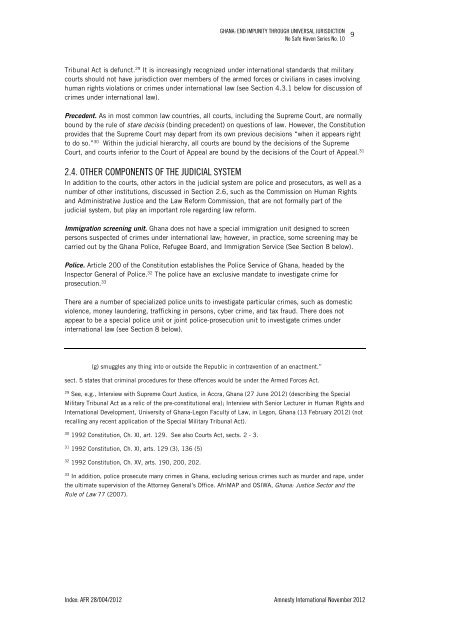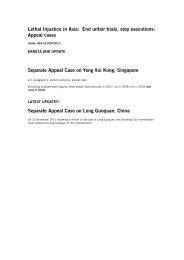Ghana - Amnesty International
Ghana - Amnesty International
Ghana - Amnesty International
You also want an ePaper? Increase the reach of your titles
YUMPU automatically turns print PDFs into web optimized ePapers that Google loves.
GHANA: END IMPUNITY THROUGH UNIVERSAL JURISDICTIONNo Safe Haven Series No. 109Tribunal Act is defunct. 29 It is increasingly recognized under international standards that militarycourts should not have jurisdiction over members of the armed forces or civilians in cases involvinghuman rights violations or crimes under international law (see Section 4.3.1 below for discussion ofcrimes under international law).Precedent. As in most common law countries, all courts, including the Supreme Court, are normallybound by the rule of stare decisis (binding precedent) on questions of law. However, the Constitutionprovides that the Supreme Court may depart from its own previous decisions “when it appears rightto do so.” 30 Within the judicial hierarchy, all courts are bound by the decisions of the SupremeCourt, and courts inferior to the Court of Appeal are bound by the decisions of the Court of Appeal. 312.4. OTHER COMPONENTS OF THE JUDICIAL SYSTEMIn addition to the courts, other actors in the judicial system are police and prosecutors, as well as anumber of other institutions, discussed in Section 2.6, such as the Commission on Human Rightsand Administrative Justice and the Law Reform Commission, that are not formally part of thejudicial system, but play an important role regarding law reform.Immigration screening unit. <strong>Ghana</strong> does not have a special immigration unit designed to screenpersons suspected of crimes under international law; however, in practice, some screening may becarried out by the <strong>Ghana</strong> Police, Refugee Board, and Immigration Service (See Section 8 below).Police. Article 200 of the Constitution establishes the Police Service of <strong>Ghana</strong>, headed by theInspector General of Police. 32 The police have an exclusive mandate to investigate crime forprosecution. 33There are a number of specialized police units to investigate particular crimes, such as domesticviolence, money laundering, trafficking in persons, cyber crime, and tax fraud. There does notappear to be a special police unit or joint police-prosecution unit to investigate crimes underinternational law (see Section 8 below).(g) smuggles any thing into or outside the Republic in contravention of an enactment.”sect. 5 states that criminal procedures for these offences would be under the Armed Forces Act.29See, e.g., Interview with Supreme Court Justice, in Accra, <strong>Ghana</strong> (27 June 2012) (describing the SpecialMilitary Tribunal Act as a relic of the pre-constitutional era); Interview with Senior Lecturer in Human Rights and<strong>International</strong> Development, University of <strong>Ghana</strong>-Legon Faculty of Law, in Legon, <strong>Ghana</strong> (13 February 2012) (notrecalling any recent application of the Special Military Tribunal Act).301992 Constitution, Ch. XI, art. 129. See also Courts Act, sects. 2 - 3.311992 Constitution, Ch. XI, arts. 129 (3), 136 (5)321992 Constitution, Ch. XV, arts. 190, 200, 202.33In addition, police prosecute many crimes in <strong>Ghana</strong>, excluding serious crimes such as murder and rape, underthe ultimate supervision of the Attorney General’s Office. AfriMAP and OSIWA, <strong>Ghana</strong>: Justice Sector and theRule of Law 77 (2007).Index: AFR 28/004/2012 <strong>Amnesty</strong> <strong>International</strong> November 2012
















